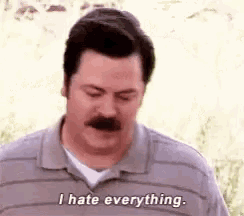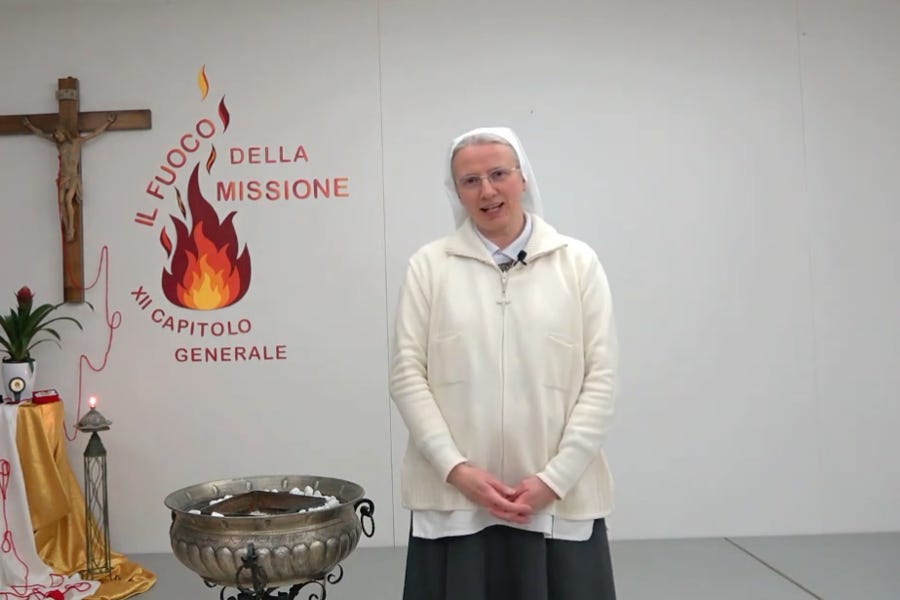Happy Friday friends,
It’s Black Friday, and this is The Pillar Post.
But this is not Ed Condon.
This is Michelle La Rosa, managing editor at The Pillar.
And today, I’m doing something a little different. I’m writing Ed’s newsletter.
Although I’ve worked with Ed for upwards of six years, I can just about count on one hand the number of times I’ve seen him in person.
We interact frequently, but almost always virtually. And as a result, I sometimes find myself tempted to believe that Ed’s grumpy old man persona is just that - an act. But just when I’m convinced that his curmudgeonly takes are little more than an entertaining facade, I end up encountering the real-live version of Ed for one reason or another, and I am reminded that Ed really is as close as one can get to Ron Swanson in the flesh.
A couple of weeks ago, Ed mentioned the wistful hope of taking the full holiday weekend off. Goodness knows I’ve been bugging him to take some time off for the last three years (his steady diet of cigarettes, red meat, and stress just can’t be good for his heart, despite his claims otherwise), so I volunteered to write this newsletter.
But I would hate to deprive the Pillar readership of their favorite grumpy old man takes at the end of the week. So I decided to write this newsletter in persona Ed - my best attempt at guessing what Ed may be thinking this weekend as he recovers from Thanksgiving dinner, holed up wherever he is away from society with a cigarette and a strong drink.
—
I trust you all had a wonderful Thanksgiving and are now enjoying the sacred American celebration of consumerism that is Black Friday.
As for myself, I have spent the better part of a day reflecting on the cultural decline of America.
Normally, I find Thanksgiving to be one of the few times a year where the festivities - or more specifically, the food - justify the social obligations.
My deep discomfort at being situated amidst a large pack of humanity stuffed into a formal dining room is offset on Thanksgiving Day by the piles of meat, potatoes, healthy doses of libations, meat, gravy, rolls, and meat.
My favorite part of the meal is the meat. When I’m hosting Thanksgiving, I break out the backyard smoker a full three days in advance. When I’m not hosting, I at least like to bring several dozen pounds of assorted meats - usually pork belly, brisket and ribs - to supplement the turkey.
But in the last few years, I’ve noticed a disturbing trend, which is the rising prominence of vegetables at Thanksgiving dinner.
Green bean casserole was already a superfluous inclusion in the Thanksgiving meal, as was that sticky sweet potato dish which does nothing but compete with the mashed potatoes (which themselves are only tolerable as a cushion for turkey gravy).
But while I have never volunteered to bring so much as an iota of green to a Thanksgiving feast, I had arrived years ago at a state of begrudging acceptance of the fact that other people at the table felt some inexplicable need to include such dishes.
Then, last year, I was shocked and distressed by the appearance of a salad at Thanksgiving dinner. A salad. Nothing special or out of the ordinary. Some lettuce, tomato, carrots, a few frilly greens, maybe some croutons. The type of side dish that makes a regular appearance at American households every other day of the year (or so I am told).

Why anyone would give up valuable Thanksgiving real estate - both on the table and in their stomachs - for a salad is inexplicable to me. I left that meal feeling flummoxed and discouraged.
I didn’t think things could sink any lower.
But, this year, they did.
After piling up my plate with every fleshly option I could find on the buffet table, I sat down and surveyed my meal.
Something seemed off. Between the dark meat of the turkey and the smoked sausage was an unfamiliar meat-looking substance that I didn’t recognize, brought by some hipster relative I also didn’t recognize.
I took one bite of the substance and immediately spat it out. Something was very wrong. This was not turkey. In fact, it was not meat.
Upon further inquiry, I discovered that this imposter of a dish was actually something called a “vegan meat alternative.”
More specifically, it was a substance, consisting of some mushed up plant parts, intentionally disguised to look like a turkey.
I cannot think of anything more disingenuous. And I’ve been covering Vatican finances for nearly a decade.
And what, you may be wondering, is the name of this atrocity?
“Seitan.” Pronounced - and I am not joking here - “Satan.”
Needless to say, I escaped from that dinner experience as quickly as humanly possible. But I’ve been stewing over it ever since.
The inclusion of that “vegan turkey” is downright offensive, not just to my personal sensibilities but to the Thanksgiving holiday itself.
Because as the history books make clear, the original Thanksgiving dinner was all about meat.
The earliest accounts of the first Thanksgiving meal indicate that it would have featured not only turkeys, but deer, a variety of shellfish, eel, waterfowl - likely ducks or geese - and pies filled not with pumpkin but with more meat.
But even more disturbing, I stumbled upon the frankly inexcusable statistic that 56% of Americans believe that offering meat free options at Thanksgiving is “important.”
That’s a solid majority of Americans who have lost sight of the reason for the season. In a holiday that is clearly intended to be about butchering animals and giving thanks, more than half think that non-meat options are not only acceptable but important.
And to some people, this apparently means the inclusion of a demonic imposter turkey dish literally named after the father of lies himself.
Like, I said, cultural decline.
And don’t even get me started on the Macy’s parade.
The News
British lawmakers today approved a bill seeking to legalize assisted suicide.
Catholic bishops have opposed the bill and asked for prayers against its passage.
Bishop John Sherrington, the lead bishop for life issues in England and Wales, stressed that “genuine compassion involves walking with those who need care, especially during sickness, disability, and old age.”
He also noted that the legislation would require medical practitioners with conscientious objections to assisted suicide to refer patients to a colleague who accepts the practice.
The bill would still need to clear several more hurdles to become law.
Parliament has previously rejected bills seeking to legalize assisted suicide. But this particular bill, which would apply to England and Wales, is believed to have a better chance of passing than most - for a few reasons.
–
Security experts believe a Vatican website crash last week bears the hallmarks of a cyberattack.
A Vatican spokesman has indicated that Vatican officials themselves suspect an attack on their web servers, after most of the Vatican’s website crashed Nov. 19, and remained unavailable for several days in some parts of the world.
If the site crash was a cyberattack, it would be the latest in a large series of politically-motivated cyber attacks against the Vatican.
The Pillar asked cybersecurity experts to weigh in on what might have happened - and what this means for Vatican security.
–
While spiritual abuse and the deployment of “false mysticism” is already recognized by the Church as a potential aggravating factor in other penal matters, it is not specifically listed as a crime which can be prosecuted in its own right in the Code of Canon Law.
Evidence from many prominent cases suggests that a period of spiritual abuse can precede other forms of abuse. But recognizing an obvious need does not mean the path to drafting a clear, and clearly prosecutable crime of spiritual abuse will be short or easy.
These types of cases can sometimes be seen as subjective or inconclusive when reported, and may be hard to assess legally.
Successfully implementing a new law will require not only a clear definition of terms, but also the creation of a culture in which people are educated in what the law says, and sensitive to what that might look like in practice for those at risk of abuse.
The Pillar examines the questions surrounding the possibility of this new delict in an analysis this week.
–
The mob injured two staff members at the school gate before ransacking classrooms, a teachers’ meeting room, and the principal’s office. Photos showed textbooks strewn across floors, plant pots smashed to pieces, cracked windows, and metal filing cabinets ripped open.
What’s behind the shocking rampage through the Catholic school? What was the context? And what’s the outlook for the future?
Luke breaks it down for us in his lastest Look Closer piece.
As a reminder, Look Closer is a feature for our paid subscribers. If you’re not yet a paid subscriber, you can upgrade here:
–
Pope Francis confirmed - yesterday - that he intends to visit Turkey next year.
While it may sound like an attempt at a Thanksgiving joke, this will actually be the fifth papal trip to the country officially known as the Republic of Türkiye.
Why is a nation with a 99.8% Muslim population such a popular papal travel destination?
We’ve got the answer for you, with a brief historical survey of the papal love of Turkey.
–
While Thanksgiving is over, you can certainly continue to ask for their intercession.
–
That’s all for this week, folks. This newsletter is a bit short, because of the bank holiday. But we’ll be back next week.
(Not) Ed. Condon
Editor
The Pillar






